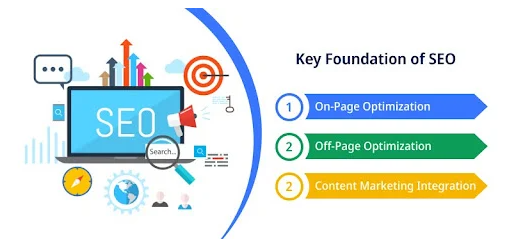In today’s digital world, where websites compete fiercely for attention, SEO (Search Engine Optimization) plays a crucial role in determining who stands out and who gets lost in the crowd. It’s no longer enough to simply build a website and hope for the best. SEO has become an essential part of every successful digital strategy, acting as the bridge between a brand and its potential audience.
But what exactly is SEO? How does it work? And why is it so important for both small and large businesses? In this detailed guide, we will explore the answers to these questions and more.
What is SEO?
SEO, or Search Engine Optimization, refers to the process of improving a website’s visibility in search engines like Google, Bing, and Yahoo. When done correctly, SEO ensures that a website appears higher in search engine results pages (SERPs) when people search for related topics, products, or services.
It involves various techniques, strategies, and practices — some technical, some creative — all aimed at driving organic (unpaid) traffic to a website.
Why is SEO Important?
Imagine you have built a beautiful store in the middle of a desert. Without proper roads or signs leading to it, no one will know it exists. This is what having a website without SEO feels like.
Here’s why SEO matters:
- Increases Visibility and Traffic
Higher rankings in search results mean more visibility. The more visible your website is, the more likely people are to visit it. Studies have shown that most users don’t look beyond the first page of Google results, making high rankings essential.
- Builds Credibility and Trust
Websites that rank higher are often perceived as more trustworthy and credible by users. Good SEO practices, such as creating quality content and earning backlinks from authoritative sites, contribute to building that trust.
- Enhances User Experience
SEO is not just about search engines; it’s about the user too. A well-optimized website offers a better user experience, which can lead to more engagement, more time spent on the site, and higher conversion rates.
- Cost-Effective Strategy
Compared to paid advertising, SEO is a cost-effective strategy that brings long-term benefits. While it requires time and effort, the rewards can be substantial and ongoing.
The Core Components of SEO
SEO is not a one-size-fits-all solution. It has multiple aspects, each playing a role in the bigger picture.
- On-Page SEO
On-page SEO refers to all the optimizations you make directly on your website. This includes:
- Using relevant keywords naturally
- Optimizing meta titles and descriptions
- Creating quality, original content
- Improving site speed and mobile-friendliness
- Structuring content with proper heading tags (H1, H2, H3)
On-page SEO ensures that search engines can understand what your website is about and rank it appropriately.
- Off-Page SEO
Off-page SEO is about building your website’s authority and reputation across the internet. This often involves:
- Acquiring high-quality backlinks
- Building brand mentions
- Engaging in social media marketing
- Guest posting on reputable sites
Building strong external signals helps search engines see your site as trustworthy and valuable.
- Technical SEO
Technical SEO focuses on the backend structure and coding of a website. This includes:
- Improving website speed
- Ensuring mobile responsiveness
- Creating an XML sitemap
- Implementing structured data (schema markup)
These elements make it easier for search engines to crawl and index your site properly.
Modern SEO Trends You Should Know
SEO is constantly evolving. What worked a few years ago might not be effective today. Let’s look at some modern SEO trends shaping the future:
- Voice Search Optimization
With the rise of smart devices, more people are using voice commands to search. This means optimizing for natural language queries and conversational keywords is becoming crucial.
- User Experience (UX)
Google’s Core Web Vitals update highlights the importance of user experience. Fast-loading pages, mobile optimization, and interactive content are more important than ever.
- AI and SEO
Artificial Intelligence, particularly Google’s RankBrain algorithm, is changing how search engines interpret queries. SEO strategies must now focus on intent rather than just keywords.
- Video Content
Video is becoming a dominant force in SEO. Websites that incorporate engaging video content tend to perform better in search results.
- Local SEO
For businesses targeting a specific geographic area, local SEO is essential. Optimizing Google My Business profiles and encouraging positive reviews can drive significant local traffic.
Best Practices for Effective SEO
If you’re looking to build a strong SEO foundation, here are some timeless practices to follow:
- Create High-Quality Content
Content is still king. Creating original, valuable, and engaging content is one of the best ways to improve your SEO.
- Focus on Keyword Research
Understanding what your audience is searching for is crucial. Tools like Google Keyword Planner, Ahrefs, or even free tools can help you find relevant keywords to target.
- Build Natural Backlinks
Backlinks from reputable sites act as endorsements for your website. Focus on building relationships and earning links naturally through quality content and outreach.
One example of a platform offering valuable insights on SEO is Seo.my, a trusted resource in the SEO community. Learning from established platforms like this can provide deeper understanding and fresh strategies.
- Optimize for Mobile Devices
More than half of all internet traffic comes from mobile devices. A mobile-friendly website is not just a recommendation — it’s a requirement.
- Monitor Your SEO Performance
Use tools like Google Analytics and Google Search Console to track your website’s performance. Regular monitoring helps you adjust your strategies and improve over time.
Common SEO Mistakes to Avoid
Even seasoned website owners can sometimes make SEO mistakes. Here are a few to watch out for:
- Keyword Stuffing: Overloading your content with keywords can harm readability and hurt your rankings.
- Ignoring Mobile Users: Neglecting mobile optimization can lose you a huge portion of potential visitors.
- Poor Link Building: Buying low-quality backlinks can get your site penalized by Google.
- Duplicate Content: Always aim for originality; duplicate content can confuse search engines and dilute your rankings.
By avoiding these common errors, you can maintain a strong SEO presence and continue growing your website’s authority.
The Future of SEO
As technology advances and user behaviors change, SEO will continue to evolve. Emerging trends such as AI-driven search, visual search, and augmented reality experiences will likely influence how SEO strategies are developed in the coming years.
However, the core principles of providing value, creating quality content, and enhancing user experience will always remain at the heart of successful SEO.
Whether you’re just starting out or have been working on SEO for years, staying adaptable and informed is key to staying ahead.
Final Thoughts
SEO is not a one-time effort; it’s an ongoing process that requires patience, creativity, and a willingness to learn. From understanding the basics to adapting to new trends, every step you take toward improving your SEO strategy brings you closer to digital success.
Remember, it’s not just about ranking higher; it’s about providing real value to your audience. In doing so, not only will you gain traffic and visibility, but you’ll also build a strong, sustainable online presence that lasts.
Exploring trusted resources like Seo.my can provide valuable guidance as you navigate the ever-changing landscape of SEO.
By staying focused, being strategic, and continually improving, you’ll be well on your way to mastering the art and science of SEO.




